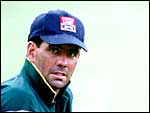Cronje to challenge life ban
By Paul Martin Cainer in Cape Town
Disgraced ex-South African cricket captain Hansie Cronjé intends to launch a court battle to try
to overturn the life ban imposed on him by the United Cricket Board last week for his involvement in the match-fixing scandal.
Cronjé's legal team believe that the procedure leading to the ban was unfair. Unlike Herschelle
Gibbs and Henry Williams (banned for six months), Cronje did not get the chance to present his
case at a hearing.
Leslie Sackstein, Cronjé's lawyer, said in Bloemfontein that he had consulted Cronje's defending
advocate Malcolm Wallis and that papers would be lodged in court soon.
Sackstein had tried to stop the United Cricket Board making the life ban public until he had had
a chance to reply to a fax advising him of the decision, sent to him on Wednesday. The UCB
refused to delay their announcement, said Sackstein.
The announcement was condemned by some South African players as very badly timed. It came just
before their crucial semi-final against India, which South Africa then lost.
It is hard to see how Cronje can successfully challenge the ban. He had himself immediately
declared, after he admitted taking bribes, that he would never again be involved in cricket.
However his recent behaviour -- including his carefully stage-mananaged meeting with the world's
moral icon Nelson Mandela, and the appeal by Mandela not to regard Cronje as a leper -- made the
United Cricket Board nervous that he could seek to stage some form of come-back, disguised as a
form of "reparation" for his ill-deeds.
He could for example have agreed to coach young players. The UCB wants Cronje kept away -- if
only because he is a very unwelcome reminder and symbol of the corruption to which world cricket
bodies (including the UCB) had turned a blind eye.
 Cronje has even hinted he could devote some of the big money he has earned and will earn from
interviews and book contracts, to supporting young cricketers. Most of the money so far raked
in will probably get used up, though, on paying enormous lawyers' bills.
Cronje has even hinted he could devote some of the big money he has earned and will earn from
interviews and book contracts, to supporting young cricketers. Most of the money so far raked
in will probably get used up, though, on paying enormous lawyers' bills.
UCB managing director Ali Bacher said from Nairobi this weekend that the board would not have
the legal right to stop Cronjé from being a commentator.
But UCB president Percy Sonn had previously warned that sponsors should not allow Cronje to be
hired to commentate on cricket, as this would damage relations between the cricket authorities
and the sponsors.
Supersport, the most likely big payer, has already told Sonn to mind his own business. Its sister company M-Net paid Cronje around one-hundred-and sixty thousand dollars for a stage-managed and sycophantic three-part "documentary".
The King Commission hearing has been delayed yet again (till November) and its slow pace is
causing frustration. Bacher did not hide the fact that he had to announce the life ban now, to
help him answer uncomfortable questions at this week's International Cricket Council meeting in
Nairobi. The slow progress of the King Commission, and the allegedly light bans on Gibbs and
Williams, may well be raised and debated.
Bacher was quoted as saying: "We did not make the announcement without consulting the judge
(Edwin King), who then gave us his blessing. Secondly, there is a meeting of the ICC executive on Monday and Tuesday, and a key topic of discussion will be the organisation's
anti-corruption programme.
"With that in mind, we felt it was an appropriate time to show ICC executive members that we
take their anti-corruption mandate seriously."
Bacher said he would ask the ICC executives in Nairobi to help define what exactly a ban from
world cricket covers. Does it prevent commentating as well?
Bacher said the UCB council had followed a "legalistic process" in banning Cronje.
One way the UCB could stop Cronje commentating, or at least make it more difficult, is to keep
him out of their cricket-grounds. The UCB has effective control of access to grounds because all
correspondents and commentators have to apply for accreditation. But they have almost never
refused to accredit anyone assigned by a recognised media organisation.
It has emerged that Bacher tried but failed to let the SA team know of the ban, a day before it
was announced. But somehow, amazingly, he could not get through to the team by phone or fax or
e-mail.
Players questioned why the announcement had been made just before an important match. "At the
very least, it's bloody awful timing and it wasn't relayed to us in the proper manner," one
player is quoted as saying, by a South African newspaper.
Cronje's successor as captain, paceman Shaun Pollock, told the media at a press conference that
the banning of Cronje represented a great loss to South African cricket.
"He had such a wealth of experience and expertise. He could have been of invaluable assistance
to younger players. But we also accept that Hansie made a bad mistake and that he himself
accepted this and realised he had to be punished.
"It's important that we learn from what happened, but it is also important that we don't wallow
in the problem. I hope Hansie can now move on in his life and that South African cricket can put
the events of this year behind it."
Asked if the timing of the announcement was a problem, Pollock replied: "The timing was not
perfect, but we are playing so much cricket this summer that there probably wasn't a perfect
time for it. Hopefully we can concentrate on cricket now."
Mail Cricket Editor